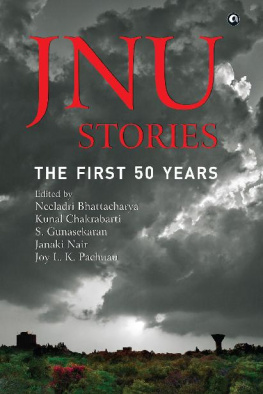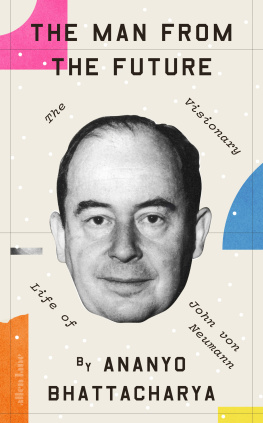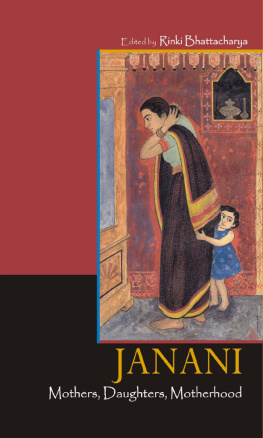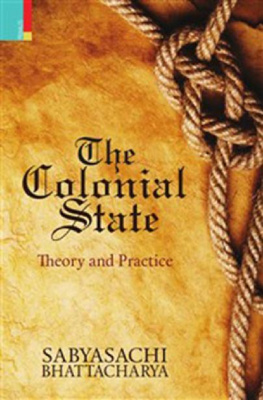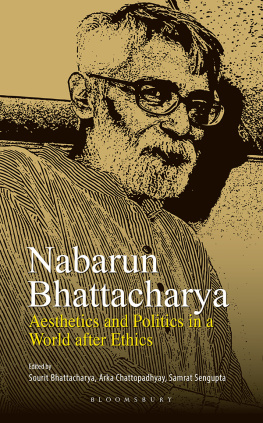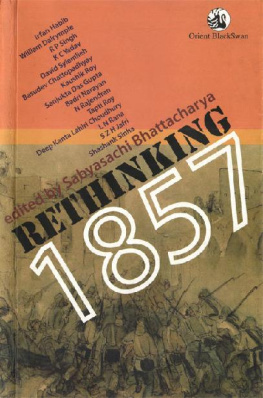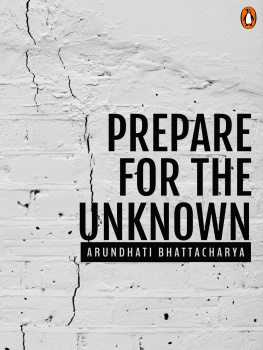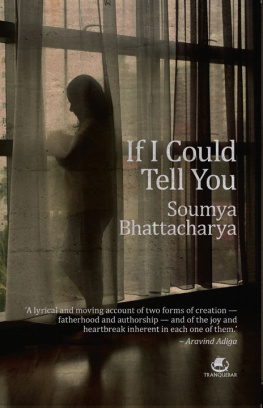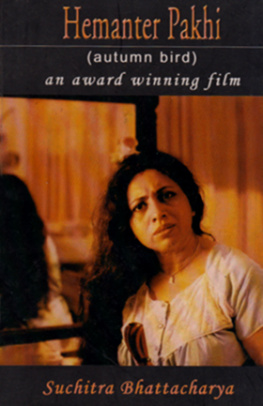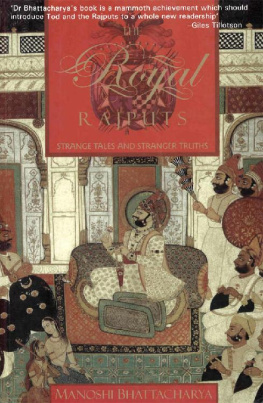JNU STORIES
JNU
STORIES
THE FIRST 50 YEARS
Edited by
Neeladri Bhattacharya
Kunal Chakrabarti
S. Gunasekaran
Janaki Nair
Joy L. K. Pachuau
ALEPH BOOK COMPANY
An independent publishing firm
promoted by Rupa Publications India
First published in India in 2020 by
Aleph Book Company
7/16 Ansari Road, Daryaganj
New Delhi 110002
Introduction Copyright Neeladri Bhattacharya and Janaki Nair
This edition copyright Aleph Book Company 2020
Copyright for individual essays vests with respective authors Credits for section openers: pp. (courtesy Samim Asgor Ali);
p. (courtesy Caf Dissensus, 11 April 2016, and Samim Asgor Ali).
All rights reserved.
The views and opinions expressed in this book are those of the authors and the facts are as reported by them, which have been verified to the extent possible, and the publisher is not in any way liable for the same.
The publisher has used its best endeavours to ensure that URLs for external websites referred to in this book are correct and active at the time of going to press. However, the publisher has no responsibility for the websites and can make no guarantee that a site will remain live or that the content is or will remain appropriate.
No part of this publication may be reproduced, transmitted, or stored in a retrieval system, in any form or by any means, without permission in writing from Aleph Book Company.
ISBN: 978-81-948741-9-5
1 3 5 7 9 10 8 6 4 2
This book is sold subject to the condition that it shall not, by way of trade or otherwise, be lent, resold, hired out, or otherwise circulated without the publishers prior consent in any form of binding or cover other than that in which it is published.
CONTENTS
NEELADRI BHATTACHARYA AND JANAKI NAIR
MUDIT TRIVEDI
VIPUL JHINGTA
SURYA PRAKASH
RAKESH BATABYAL
GYAN PRAKASH
ATIYA HABIB KIDWAI
SUKHADEO THORAT
RITOO M . JERATH
NEELADRI BHATTACHARYA
JAYATI GHOSH
PUSHPESH PANT
SUDHIR K . SOPORY
ALOK BHATTACHARYA
RAM RAMASWAMY
BIRENDRA N . MALLICK
JYOTINDRA JAIN
G . ARUNIMA
NIRAJA GOPAL JAYAL
TIPLUT NONGBRI
ROMILA THAPAR
UDAYA KUMAR
SUDIPTA KAVIRAJ
D . RAGHUNANDAN
ABHIJIT BANERJEE
NAMAN P . AHUJA
GIRIJA KUMAR
L . N . MALIK
ASHISH DAS
PRABHAT PATNAIK
IMRANA QADEER
KUNAL CHAKRABARTI
Z . BHATIA NE HAUHNAR
MUKUL MANGALIK
AMIT SENGUPTA
LATEEF
MOHAN RAO
ROHAN DSOUZA
JAIRUS BANAJI
KAMAL MITRA CHENOY
ALBEENA SHAKIL
KAVITA KRISHNAN
LALTHUAMLIANA
ROHIT AZAD
SUMANGALA DAMODARAN
AKASH BHATTACHARYA
SONAJHARIA MINZ
KANHAIYA KUMAR
KULDEEP KUMAR
PURUSHOTTAM AGRAWAL
GOPAL GURU
AYESHA KIDWAI
MARIO DA PENHA
SHIPRA NIGAM AND ANKITA PANDEY
SOHAIL HASHMI
HARBANS MUKHIA
PRABIR PURKAYASTHA
JANAKI NAIR AND RANJAN GHOSH
NAGESH HEGDE
KANJIV LOCHAN
( )
D . BANERJI
DHRUV RAINA
CHITRA HARSHVARDHAN AND MADHU SAHNI
SALLY J . SUTHERLAND GOLDMAN AND ROBERT P . GOLDMAN
A RI S ITAS
DEBORAH SUTTON
QUOC ANH NGUYEN
HAPPYMON JACOB
KANAD SINHA
YOGENDRA YADAV
AVIJIT PATHAK
A . LOZAANBA KHUMBAH
ANIL BHATTI
INTRODUCTION
A RED-BRICK UNIVERSITY WITH A DIFFERENCE
NEELADRI BHATTACHARYA AND JANAKI NAIR
I t is only rarely that an Indian public institution makes a commitment to the preservation of institutional memory. JNUsurprisingly given its reputationappears to have been no exception. To look back, therefore, on fifty years of an institutions existence minus the vital prop of an official archive calls for a different kind of reconstructive effort, especially when the structures and processes that have been carefully nurtured and built up through a process of debate and discussion, trial and revision, are severely strained today. Yet, now more than ever, when even the past is no longer safe from the determined effort to refashion memorythereby threatening institutions themselvessuch reconstruction is not an option but an imperative, an archival effort in itself, a debt owed to all those whose lives were touched and transformed by the life of this institution. More importantly, the way institutions like JNU think and function is crucial to the history of higher education in India and the sociology of knowledge more generally. A crisis can thus be turned into an opportunity and this book is a small step towards creating that opportunity.
Institutions develop within and against moulds. The biography of such an institution cannot afford to be a mere laundry list of achievements; rather, it must equally record and confront the failures, the struggles, sometimes unsuccessful, in breaking out of preconceived moulds as well as in creating alternatives. What are the thought worldshere not to be confused with schools of thoughtthat have been enabled in a space like JNU? Did it live up to the dreams and aspirations of those responsible for its early existence? What was the distinctive culture of teaching and learning built up at JNU and to what pressures, changes, and developments did this culture respond and adapt? Were there also unanticipated consequences of this culture of learning and teaching? Most important, to what extent can the more positive of these be replicated in other locations?
The Idea of a New University
Jawaharlal Nehru University has had a complicated history as an idea. By the late 1950s, Delhi University was facing a crisis: there had been an exponential increase in student population, colleges were mushrooming, finances were inadequate, the infrastructure was under pressure, and administration from the university office in North Delhi was stretched to a breaking point. C. D. Deshmukh and others in the University Grants Commission felt that a second campus in South Delhi would resolve the immediate problem, relieving pressure on the North Campus and dividing administrative responsibilities. When persuaded to join as the Vice Chancellor of Delhi University, Deshmukh participated in concretizing the project. The idea was to split the university of Delhi into two, somewhere close to Ajmeri Gate, but for historical reasons, retaining Delhi College within the jurisdiction of the North Campus.
The UGC discussed the scheme and sent a plan to the Education Ministry; in 1963 an Expert Committee was set up by the Ministry to work out the broad proposal, and M. C. Chagla, the Education Minister, talked to Nehru about the idea. In his memoir, Chagla recounts the conversation:
I had once told Nehru that if I had his approval, I would establish another university in Delhi. I explained that Delhi was growing and one university was not adequate for its student population. Nehru agreed. I then mentioned with some hesitation a more delicate point. I said: Panditji, I would like to name this university after you. You have been the Prime Minister of this country since its independence, and you have ruled over our destinies from this city. Nehru flared up: You know my views about raising memorials to living persons. It is entirely wrong. No statues should be raised to living persons and no institutions should be named after them. I persisted that the only appropriate name for the university was Nehru University. He refused to give way, and reminded me that there were several names to choose from. Delhi had been called differently at different times in its history, and I could select one of these names. He suggested Raisina as a possibility; it is a very fine sounding name.



